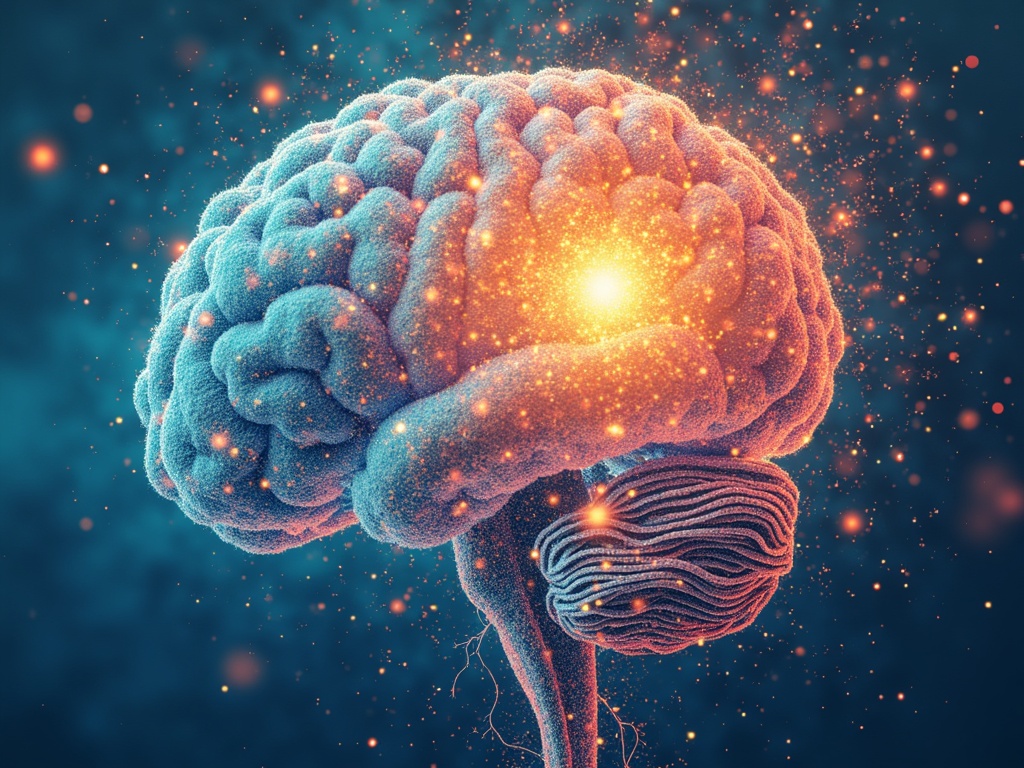Unlocking Clarity: The Surprising Connection Between Gut Health and Brain Fog
Ever walk into a room and completely forget why you're there? Or struggle to recall a simple word during a conversation? That frustrating mental haze, often called brain fog, is more than just an occasional annoyance. While stress and lack of sleep are common culprits, a growing body of research points to a surprising source: your gut. The connection between gut health and brain fog is a fascinating and increasingly understood field, revealing how the trillions of bacteria residing in your digestive system can significantly impact your cognitive function.
What is Brain Fog? Unveiling the Mental Haze
Brain fog isn't a medical diagnosis, but rather a descriptive term for a collection of cognitive symptoms. These can include:
- Difficulty concentrating
- Memory problems
- Mental fatigue
- Lack of mental clarity
- Feeling spaced out or disconnected
- Trouble finding the right words
The severity of brain fog varies. For some, it's a mild, fleeting inconvenience. For others, it can be debilitating, impacting their ability to work, study, and engage in daily life. It can feel like wading through mental mud, hindering your ability to think clearly and efficiently. Understanding the potential root causes, including the intricate dance between your gut and your brain, is the first step toward finding relief.
The Gut-Brain Axis: A Two-Way Street
The gut-brain axis is a complex communication network linking your gastrointestinal tract and your brain. This intricate system involves:
- The Vagus Nerve: This cranial nerve acts as a direct line of communication, sending signals between the gut and the brain.
- Neurotransmitters: The gut produces many neurotransmitters, including serotonin (linked to mood regulation), dopamine (associated with reward and motivation), and GABA (a calming neurotransmitter). These can directly influence brain function.
- The Immune System: A significant portion of your immune system resides in your gut. Gut imbalances can trigger inflammation that affects the brain.
- Gut Microbiota: The trillions of bacteria, viruses, fungi, and other microorganisms in your gut play a crucial role in digestion, nutrient absorption, and immune function. They also influence the gut-brain axis by producing various compounds that affect the brain.
This isn't a one-way street. The brain also influences the gut. Stress, anxiety, and other psychological factors can alter gut motility, gut permeability (the leakiness of the gut lining), and the composition of the gut microbiota. This bidirectional communication highlights the profound impact each system has on the other.
How Gut Imbalances Can Cause Brain Fog
When the gut microbiota is out of balance – a condition called dysbiosis – it can trigger a cascade of events that contribute to brain fog:
- Increased Inflammation: Dysbiosis can lead to increased gut permeability, allowing bacteria and other toxins to leak into the bloodstream. This triggers systemic inflammation, which can negatively impact brain function and contribute to brain fog. Chronic inflammation is a known factor in numerous neurological conditions.
- Neurotransmitter Imbalances: If the gut microbiota is not producing adequate amounts of beneficial neurotransmitters, or if it's producing excessive amounts of harmful substances, this can disrupt brain function and contribute to cognitive issues.
- Nutrient Deficiencies: An unhealthy gut may not be able to properly absorb essential nutrients like vitamins B12, D, and magnesium, which are crucial for brain health.
- Production of Neurotoxins: Certain bacteria can produce neurotoxins that directly affect brain function. For instance, excessive ammonia production in the gut can lead to cognitive impairment.
These disruptions can manifest as difficulty concentrating, memory problems, mental fatigue, and other symptoms characteristic of brain fog. Addressing the gut imbalance may therefore alleviate these cognitive symptoms.
Common Gut Issues Linked to Brain Fog
Several specific gut conditions have been linked to brain fog:
- Leaky Gut Syndrome: Increased intestinal permeability allows substances to enter the bloodstream, triggering widespread inflammation that can affect the brain.
- Small Intestinal Bacterial Overgrowth (SIBO): An excessive amount of bacteria in the small intestine can interfere with nutrient absorption and produce toxins that impair cognitive function.
- Irritable Bowel Syndrome (IBS): IBS is often associated with gut dysbiosis and increased inflammation, both of which can contribute to brain fog.
- Food Sensitivities and Intolerances: Reactions to certain foods can trigger inflammation in the gut and elsewhere in the body, potentially leading to brain fog.
- Candida Overgrowth: An overgrowth of Candida yeast in the gut can produce toxins that affect brain function.
Identifying Gut-Related Brain Fog: Symptoms and Testing
While brain fog itself is a symptom, certain accompanying signs may point to a gut-related cause:
- Digestive issues like bloating, gas, constipation, or diarrhea.
- Food sensitivities or intolerances.
- Skin problems like eczema or acne.
- Fatigue and low energy levels.
- Autoimmune conditions.
- Mood disorders like anxiety or depression.
If you suspect your brain fog is linked to your gut, consider consulting with a healthcare professional who specializes in gut health. They may recommend the following tests:
- Comprehensive Stool Test: To assess the composition of your gut microbiota and identify any imbalances.
- SIBO Breath Test: To detect an overgrowth of bacteria in the small intestine.
- Food Sensitivity Testing: To identify foods that may be triggering inflammation.
- Leaky Gut Testing: To assess intestinal permeability.
Strategies to Heal Your Gut and Clear the Fog
Fortunately, there are numerous strategies you can implement to improve your gut health and potentially alleviate brain fog:
Dietary Changes: Fueling a Healthy Gut
- Eat a diverse range of plant-based foods: Fruits, vegetables, and whole grains provide fiber, which nourishes beneficial gut bacteria.
- Limit processed foods, sugar, and unhealthy fats: These can contribute to gut dysbiosis and inflammation.
- Identify and eliminate food sensitivities: Consider an elimination diet to pinpoint foods that may be triggering your symptoms.
- Incorporate fermented foods: Yogurt (with live and active cultures), kefir, sauerkraut, kimchi, and kombucha contain beneficial probiotics that can help restore balance to your gut microbiota.
Supplementation: Supporting Gut Health
- Probiotics: These supplements contain live bacteria that can help replenish beneficial gut flora. Choose a high-quality probiotic with a diverse range of strains.
- Prebiotics: These are non-digestible fibers that feed beneficial gut bacteria. Examples include inulin, fructooligosaccharides (FOS), and resistant starch.
- L-Glutamine: This amino acid helps repair and strengthen the gut lining.
- Digestive Enzymes: These can help break down food and improve nutrient absorption.
- Omega-3 Fatty Acids: Found in fish oil and flaxseed oil, these have anti-inflammatory properties that can benefit both the gut and the brain.
Lifestyle Modifications: Nurturing the Gut-Brain Axis
- Manage stress: Chronic stress can negatively impact the gut microbiota. Practice stress-reducing techniques like meditation, yoga, or spending time in nature.
- Get enough sleep: Sleep deprivation can disrupt the gut microbiota and contribute to inflammation. Aim for 7-9 hours of quality sleep per night.
- Stay hydrated: Drinking plenty of water helps maintain gut motility and supports overall health.
- Exercise regularly: Physical activity can improve gut health and reduce inflammation.
The Gut-Brain Connection: A Promising Avenue for Cognitive Wellness
The connection between gut health and brain fog is undeniable. By understanding this intricate relationship and taking steps to heal your gut, you may be able to clear the mental haze and unlock greater cognitive clarity. While more research is ongoing, the existing evidence underscores the critical role of a healthy gut in overall well-being, including brain function. Embrace a holistic approach that encompasses diet, lifestyle, and targeted supplementation to nourish your gut and, in turn, nourish your mind. The path to a clearer mind may very well begin in your gut.

